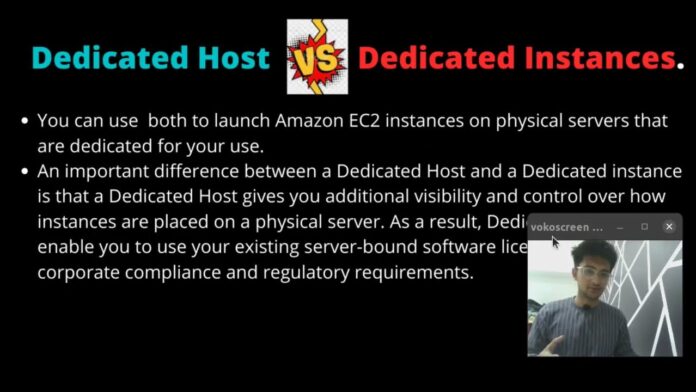In today’s rapidly evolving digital landscape, having a reliable and high-performing website is crucial for businesses of all sizes. With the increasing number of online users, it has become more important than ever to invest in a hosting solution that can meet the demands of your website or application. While shared and cloud hosting are popular options for their cost-effectiveness and scalability, they may not always provide the level of control and performance that some businesses require. This is where dedicated hosting comes in as the ultimate solution for those seeking complete control over their server resources. In this article, we will dive into the world of dedicated hosting, exploring its features, benefits, disadvantages, and how to choose the right dedicated server for your unique needs.
Why Choose Dedicated Hosting? Benefits and Use Cases
Dedicated hosting offers numerous benefits, making it a top choice for businesses with high-traffic websites or demanding applications. Let’s take a closer look at some of the key advantages of dedicated hosting and how they can benefit your online presence.
Unparalleled Control and Customization
One of the main reasons why businesses opt for dedicated hosting is the level of control it provides. With dedicated hosting, you have complete access to the server’s hardware, software, and operating system. This means you have the freedom to configure the server as per your specific requirements, whether it’s for website optimization, resource allocation, or security measures. Additionally, you are not limited by the restrictions typically imposed by shared hosting, giving you the flexibility to install custom software and make changes to the server settings as needed.
Enhanced Performance and Reliability
With dedicated hosting, your website or application has exclusive access to the server’s resources, eliminating any impact from other websites on the same server. This translates to faster loading times, improved website performance, and higher website uptime, ensuring that your visitors have a smooth and seamless experience. Dedicated hosting is also more reliable than shared hosting, as it eliminates the risk of server crashes or slowdowns caused by other websites on the same server.
Security and Scalability
Security is a top concern for businesses with an online presence, and dedicated hosting offers robust security features to keep your website and data safe. With dedicated hosting, you have complete control over the server’s security measures, such as firewalls, antivirus software, and encryption protocols. This allows you to customize your security settings to meet your specific needs and ensure the safety of your website and sensitive data.
Moreover, dedicated hosting also provides scalability, allowing you to easily upgrade or downgrade your server resources as needed. This is especially beneficial for businesses with fluctuating traffic levels, as they can adjust their server resources accordingly without any downtime or disruptions.
Use Cases for Dedicated Hosting
Dedicated hosting is suitable for a wide range of use cases, making it a versatile solution for various business needs. Some common use cases for dedicated hosting include:
- High-traffic websites: If your website receives a high volume of traffic, dedicated hosting can help you ensure optimal performance and avoid issues such as slow loading times or crashes.
- E-commerce sites: For businesses that rely on their online store to generate revenue, dedicated hosting can provide the necessary speed, reliability, and security to support a large number of transactions.
- Resource-intensive applications: Certain applications, such as video streaming platforms or gaming servers, require a significant amount of server resources. Dedicated hosting is ideal for these types of applications, as it allows for maximum resource utilization and custom configurations to optimize performance.
- Data storage and management: Businesses dealing with large amounts of data, such as medical records or financial information, can benefit from dedicated hosting’s privacy and security features to store and manage their data securely.
Dedicated Hosting vs Shared Hosting: Which is Right for You?

While dedicated hosting offers a wide range of benefits, it may not be the ideal solution for every business. In some cases, shared hosting may be a more suitable option depending on your specific needs and budget. Let’s compare dedicated hosting and shared hosting to help you determine which one is right for you.
Resource Allocation
As mentioned earlier, with dedicated hosting, you have exclusive access to all of the server’s resources, meaning that they are solely allocated to your website or application. On the other hand, shared hosting divides the server resources among multiple websites, which can result in slower loading times or performance issues if one website consumes too many resources. If your website requires a significant amount of resources to operate efficiently, dedicated hosting is the better option.
Cost
Shared hosting is often the more affordable option compared to dedicated hosting, as the costs are divided among multiple websites. This makes it an attractive option for businesses with a limited budget. However, with dedicated hosting, you get what you pay for – complete control and customization options, enhanced security, and top-notch performance. It’s essential to consider your budget and assess whether the added benefits of dedicated hosting justify the higher price tag.
Scalability
Shared hosting typically offers limited scalability options, as you are sharing resources with other websites on the same server. This means that if your website starts receiving high levels of traffic, you may experience slowdowns or crashes unless you upgrade to a higher hosting plan. Dedicated hosting, on the other hand, allows you to easily scale your server resources up or down as needed, making it a more flexible option for businesses with fluctuating resource demands.
Security
When it comes to security, dedicated hosting offers more robust features and customization options compared to shared hosting. With dedicated hosting, you have control over all aspects of your server’s security, from firewalls and encryption to software installations and updates. This level of control allows you to implement advanced security measures tailored to your specific needs and keep your website and data safe from cyber threats.
Shared Hosting May Be a Better Option If:
- You have a limited budget and your website does not require a significant amount of resources.
- Your website is relatively small and does not receive a high volume of traffic.
- You do not have the technical knowledge or resources to manage and maintain a dedicated server.
- You do not need advanced security features or customization options for your website.
Dedicated Hosting May Be a Better Option If:
- Your website receives a high volume of traffic and requires fast loading times and optimal performance.
- You have resource-intensive applications or websites that require a significant amount of server resources.
- You need complete control over your server’s security measures and configurations.
- You have the technical expertise or resources to manage and maintain a dedicated server.
- You want the flexibility to upgrade or downgrade your server resources as needed.
Understanding Dedicated Server Configurations and Options

When choosing a dedicated hosting solution, it’s essential to understand the various configurations and options available. This will help you determine the right server specifications to meet your unique needs. Here are some key factors to consider:
Processor
The processor, also known as the Central Processing Unit (CPU), is the brain of the server, responsible for executing instructions and carrying out calculations. When it comes to dedicated hosting, you will often come across two types of processors: Intel and AMD. These processors come with different speeds and cores, which affect the server’s overall performance. For example, a server with multiple cores will be able to handle more workload and processes compared to a server with fewer cores.
RAM
Random Access Memory (RAM) is a crucial component of a server’s performance, as it affects the speed at which data can be accessed and processed. The more RAM a server has, the faster it can process information, resulting in improved website loading times and overall performance. When choosing a dedicated server, it’s essential to consider your website’s resource requirements and choose a server with enough RAM to meet those needs. As a general rule, aim for at least 8GB of RAM for small- to medium-sized websites, and increase the amount as needed for resource-intensive applications or high-traffic sites.
Storage
There are two types of storage options available for dedicated servers: Hard Disk Drive (HDD) and Solid-State Drive (SSD). HDDs are traditional storage devices that use spinning disks to store data, while SSDs use flash memory, resulting in faster read and write speeds. SSDs are more expensive than HDDs but offer improved performance, making them a popular choice for dedicated hosting. When selecting a dedicated server, consider the amount of storage you will need for your website or application and choose the type of storage based on your budget and performance requirements.
Bandwidth
Bandwidth refers to the amount of data that can be transferred between the server and visitors’ devices. Dedicated hosting plans often come with unmetered bandwidth, meaning that there is no limit on the amount of data that can be transferred. However, some providers may impose a bandwidth limit, after which you may have to pay additional fees. It’s crucial to understand your website’s bandwidth needs and choose a dedicated server plan with sufficient bandwidth to avoid any unexpected charges.
Operating System
The operating system (OS) is the software that manages the server’s hardware and resources, allowing it to run smoothly and efficiently. Some popular OS choices for dedicated hosting include Linux distributions such as CentOS, Ubuntu, and Debian, as well as Windows Server. The OS you choose will depend on your specific needs, technical expertise, and compatibility with your website or application.
The Cost of Dedicated Hosting: Factors Influencing Pricing
As mentioned earlier, dedicated hosting typically comes at a higher price compared to shared hosting, and the cost may vary depending on various factors. Before making a decision, it’s essential to understand the different factors that influence the cost of dedicated hosting.
Server Specifications
The server specifications, such as processor, RAM, storage, and bandwidth, significantly impact the pricing of dedicated hosting plans. A server with higher resource allocations will typically come at a higher cost compared to one with lower specifications. It’s crucial to determine your website’s resource requirements and choose a server plan that offers the necessary resources without overspending on unnecessary specifications.
Managed vs Unmanaged Hosting
With dedicated hosting, you have the option to choose between managed or unmanaged hosting. With managed hosting, the provider takes care of all server maintenance, updates, and security measures for you, allowing you to focus on your website or application. This convenience often comes at a higher price than unmanaged hosting, where you are responsible for managing and maintaining the server yourself.
Additional Features and Services
Depending on your needs, you may require additional features and services, such as advanced security measures, control panel software, and technical support. These may come at an extra cost, so it’s essential to understand the features and services included in your dedicated hosting plan and assess whether you need any add-ons that may increase the overall cost.
Choosing the Right Dedicated Hosting Provider for Your Needs
Once you have determined that dedicated hosting is the best solution for your website, the next step is to choose a reliable and reputable hosting provider. With numerous options available in the market, it can be challenging to make the right choice. Here are some key factors to consider when choosing a dedicated hosting provider:
- Reputation: Look for providers with a solid track record and positive customer reviews.
- Reliability and Performance: Your hosting provider should guarantee high uptime and fast loading times for your website or application.
- Support: Choose a provider that offers 24/7 technical support to assist with any issues that may arise.
- Scalability: Ensure that the provider offers flexible server options to allow for easy upgrading or downgrading as needed.
- Customization Options: Look for a provider that allows you to customize your server configurations and settings to meet your specific needs.
- Security Measures: The provider should offer robust security features to keep your website and data safe from cyber threats.
Setting Up and Managing Your Dedicated Server: A Step-by-Step Guide
Once you have selected a dedicated hosting provider and chosen your server plan, it’s time to set up and manage your dedicated server. Here is a step-by-step guide to get you started:
Step 1: Choose an Operating System
The first step is to choose an operating system for your server. As mentioned earlier, popular OS choices for dedicated hosting include Linux distributions and Windows Server. Consider your technical expertise and compatibility with your website or application when making this decision.
Step 2: Configure Your Server Settings
Next, you will need to configure your server settings, such as server name, password, timezone, and network settings. This can usually be done through your hosting provider’s control panel or via command line if you have opted for unmanaged hosting.
Step 3: Install and Set Up Control Panel Software
If you have opted for managed hosting, your provider will install and set up a control panel software for you, allowing for easy management of your server’s resources and settings. If you have chosen unmanaged hosting, you will need to install and configure the control panel yourself.
Step 4: Install Necessary Software and Applications
Depending on your website’s requirements, you may need to install additional software and applications on your server. This could include a web server, database software, and any other tools or programs needed for your website or application to function.
Step 5: Set Up Security Measures
One of the advantages of dedicated hosting is the ability to implement advanced security measures for your server. Set up firewalls, antivirus software, and other security measures to protect your website and data from cyber threats.
Step 6: Test and Monitor Your Server
Once your server is set up, it’s crucial to test its performance and monitor its resources to ensure that everything is functioning correctly. You can use tools such as Pingdom or Uptime Robot to monitor your server’s uptime and response time and take necessary actions if any issues arise.
Security and Management: Ensuring the Safety of Your Dedicated Server
With dedicated hosting, you have complete control over your server’s security measures, making it your responsibility to ensure that your server is protected from cyber threats. Here are some essential security measures to consider:
- Implement a firewall to control incoming and outgoing network traffic.
- Install antivirus software to detect and remove any malicious files or programs.
- Regularly update your server’s software and operating system to patch any vulnerabilities.
- Use strong passwords and enable two-factor authentication to prevent unauthorized access to your server.
- Back up your server regularly to avoid data loss in case of any security incidents.
Apart from security, managing a dedicated server also involves routine maintenance tasks, such as updating software and monitoring resources to ensure optimal performance. If you have opted for managed hosting, these tasks will be taken care of by your hosting provider. However, with unmanaged hosting, it’s essential to have the technical expertise or resources to manage and maintain your server effectively.
Dedicated Hosting for Businesses: Unleashing Growth Potential
For businesses with an online presence, choosing the right hosting solution is crucial for growth and success. Dedicated hosting offers the level of control, performance, and security that businesses need to thrive in today’s digital landscape. Here are some ways dedicated hosting can benefit businesses:
Improved Website Performance
In today’s fast-paced world, users expect websites to load quickly and function seamlessly. With dedicated hosting, businesses can ensure optimal website performance and fast loading times, resulting in a better user experience and increased customer satisfaction.
Enhanced Security
For businesses that deal with sensitive information such as customer data or financial records, security is a top priority. Dedicated hosting’s customizable security measures allow businesses to protect their data and customers’ privacy, building trust and credibility with their audience.
Scalability for Growth
As businesses grow and their resource demands increase, dedicated hosting offers the flexibility to easily upgrade server resources without any downtime or disruptions. This allows businesses to scale their online presence as needed, accommodating higher traffic levels and expanding their offerings.
Customization for Unique Needs
Every business has its unique needs and requirements, and dedicated hosting allows for customized server configurations and settings to meet those specific needs. This level of control not only improves performance but also helps businesses tailor their websites or applications to their target audience and industry.
The Future of Dedicated Hosting: Emerging Trends and Technologies
The world of technology is ever-evolving, and the hosting industry is no exception. As we move towards a more digital future, dedicated hosting is expected to see some significant developments and trends. Here are some emerging technologies that may shape the future of dedicated hosting:
Edge Computing
Edge computing involves processing data at the edge of a network, closer to where it is generated, rather than in a centralized data center. This can significantly reduce latency and improve website performance, making it an attractive option for businesses with global audiences.
Virtualization
Virtualization technology allows for the creation of multiple virtual servers on a single physical server, allowing for more efficient resource utilization. This could potentially reduce the cost of dedicated hosting and make it more accessible to businesses with limited budgets.
Containerization
Containerization is a form of virtualization that allows for the creation of isolated environments, or containers, to run applications. This can provide a more lightweight and efficient alternative to traditional server virtualization and may become a popular option for dedicated hosting in the future.
Hybrid Hosting
Hybrid hosting combines the benefits of different hosting solutions, such as dedicated andcloud hosting, to create a flexible and scalable infrastructure. This allows businesses to leverage the strengths of each type of hosting to meet their specific needs, whether it’s performance, security, or cost efficiency.
AI-Powered Automation
Artificial intelligence (AI) is being increasingly integrated into hosting services to automate routine tasks, improve server management, and enhance security measures. AI-powered solutions can help optimize server performance, troubleshoot issues, and enhance the overall hosting experience for users.
Sustainable Hosting Practices
With growing concerns about environmental impact, hosting providers are exploring ways to adopt more sustainable practices. This includes using renewable energy sources, optimizing server resource allocation, and implementing energy-efficient technologies to reduce carbon footprint and promote eco-friendly hosting solutions.
As technology continues to advance, dedicated hosting is poised to evolve and adapt to meet the changing needs of businesses and users. By staying informed about emerging trends and technologies in the hosting industry, businesses can make well-informed decisions to maximize the benefits of dedicated hosting for their online presence.
Conclusion
Dedicated hosting offers unparalleled control, performance, and security for websites and applications with high resource demands. By choosing dedicated hosting, businesses and individuals can customize their server configurations, optimize performance, and implement advanced security measures to ensure a seamless online experience for their users.
When selecting a dedicated hosting provider, it’s essential to consider factors such as server configurations, pricing, security measures, and technical support to meet your specific needs. Whether you’re running a small website, an e-commerce platform, or a large enterprise application, dedicated hosting provides the infrastructure and resources to support your growth and success in the digital world.
By following best practices for setting up, managing, and securing your dedicated server, you can unleash its full potential and unlock new opportunities for your online presence. With the future of dedicated hosting focusing on emerging technologies such as edge computing, virtualization, and AI automation, the possibilities for innovation and growth are limitless in the dynamic world of hosting services.
Choose dedicated hosting for powerful performance, unmatched security, and the scalability to fuel your digital ambitions. Experience the difference that dedicated hosting can make for your online presence and elevate your website or application to new heights of success and reliability.









